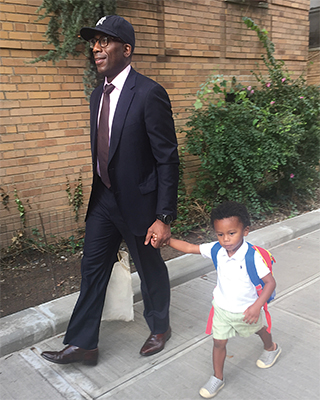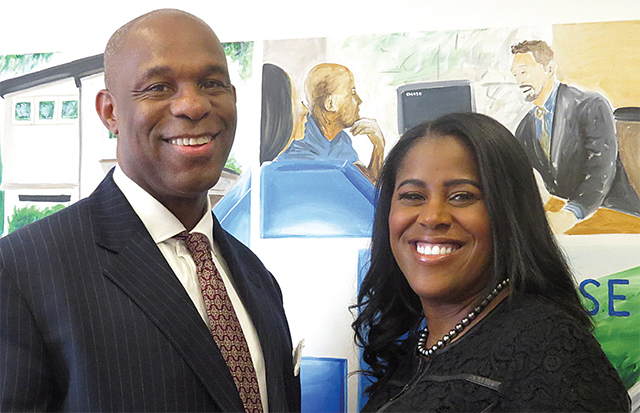As a child, Donald Felix watched his mother wake up at 4 a.m. each morning and rush off to work an eight-hour shift as a nursing assistant. She then traveled an hour and a half to her other job, where she worked another eight hours. Felix came to understand her selflessness and sacrifice was so that he and his two sisters could pursue a future that his high school-educated immigrant parents didn’t have. Fast forward a few decades and a Howard University and Wharton degree later, Felix has certainly made his parents proud. In addition to a clear intellect and strong work ethic, humility is the trait that is most apparent when meeting him. A learned quality from his upbringing, it is one that suits him well as he rapidly ascends in the financial services sector in corporate America.
Felix is one example of the talent that has come through the doors at JPMorgan Chase since it launched Advancing Black Leaders in 2016, a diversity strategy to attract, hire, retain and advance black talent at every level in the organization. Advancing Black Leaders opened a pathway that connected Felix with access to top executives and an unrivaled community of networking and support. This is what made JPMorgan Chase his employer of choice, as well as many others’ who have joined the firm in the last two years. Advancing Black Leaders was originally identified by the firm’s top leadership, starting with Chairman and CEO Jamie Dimon and the Operating Committee in February 2016. The strategy and day-today implementation is led by Valerie Rainford, a former operations executive who also now leads the firm’s Diversity Advancement Strategies. Rainford was tapped to lead this strategy not only for her 30+ years as an outstanding business leader, but also due to her long-standing history as a trailblazer in promoting and advancing diversity strategies in the workforce.

Donald Felix, JPMorgan Chase, Executive
Director in Chase Consumer Bank, walks
his son August to school.
The Advancing Black Leaders diversity strategy is designed to expand sourcing and recruitment capability while promoting leadership excellence and retention at all levels from within the black community. To attract and hire, Advancing Black Leaders is working to increase the junior talent pipeline and the talent pool for open positions. To retain and advance, the strategy identifies performance excellence and opportunities for development and advancement for internal talent. “We know that to be a cut above the rest, we have to think ahead and attract a diverse spectrum of people to work at JPMorgan Chase,” Rainford says. “Creating a diverse talent pool is part of the cultural fabric central to who we are as a company and frankly, it’s how businesses today will thrive tomorrow.”
Bold approaches The business case for such initiatives as Advancing Black Leaders is clear. Studies show that racially diverse teams outperform homogenous ones by more than a third. And selection bias meansblack Americans are less likely to secure job interviews than their white counterparts. Bold approaches, such as Advancing Black Leaders, aims to close that gap and set best practices for an industry and corporate America more broadly that is lacking diversity in the executive ranks. In many ways, Advancing Black Leaders is not a disparate part of the institution, but a parallel arm that aligns perfectly with JPMorgan Chase’s larger goals of attracting and retaining the best talent, and carving out career paths for employees where they can learn and grow and gain diverse experience across different lines of business, building different skill sets. That ethos is precisely the life cycle that Felix has experienced at the firm.
After starting in the auto line of business for JPMorgan Chase two years ago, less than 90 days into the job, Felix’s boss Thasunda Duckett was approached with a tremendous offer to run Chase’s Consumer Bank, overseeing more than 5,200 branches and 16,000 ATMs that serve 24 million households nationwide. Though they had only worked together for a short while, Felix raised his hand to join her and she, impressed by his abilities and work ethic, decided to offer him a role. “His differentiator is the how,” Duckett, CEO of Chase’s consumer bank, said of Felix. “He takes whatever is needed to get it done. No detail is too small. The minor is his major.”
Felix now works as Duckett’s Business Manager, a job that requires both an incredibly acute attention to detail on numerous moving parts and bold, big-picture thinking to move the centuries old bank forward in innovative ways. “I don’t stop until the job is done. It’s important to be 100% in the role you’re in,” Felix says. “It was a no brainer to come here because there is a concerted effort on talent and a specific effort around advancing black leaders.”
Promising progress
While Felix’s rapid rise isn’t necessarily typical, it’s exciting that it is possible in an organization as large as JPMorgan Chase. In addition to running the biggest bank in America in terms of total deposits, Duckett also sits on the Leadership Council of Advancing Black Leaders. “The power of diversity is not just about technical expertise, but about perspective,” she says. “Advancing Black Leaders has created a community that is a part of the bigger JPMorgan Chase family.” The strategy has already seen promising progress in increasing the number of black executive hires and has helped to strengthen a community and develop a stronger support network.

Thasunda B. Duckett, CEO
of Chase’s Consumer Bank and
Rodney Miller, a Vice Chairman
of the JPMorgan Chase’s
Investment Bank.
Managers across the firm in all lines of business now incorporate the diversity strategy into their hiring approaches, an impact that will be seen for years to come. The emerging success of Advancing Black Leaders is also due in good part to the commitment from the very top-down, including enthusiastic support from JPMorgan Chase Chairman and CEO Jamie Dimon. “Maintaining a diverse and inclusive workplace where everyone can thrive is the smart thing to do,” Dimon says. “People are our most important asset. The long–term growth and success of JPMorgan Chase depends on our ability to attract and retain our employees.”
“What it took you to become a great organization is different than what it will take to continue to be a great organization,” says Rodney Miller, a Vice Chairman of JPMorgan Chase’s investment bank, who also sits on the Leadership Council of Advancing Black Leaders.
“You can’t just drive by looking in the rearview mirror; diversity prepares you for that successful future.” Duckett adds, “Advancing Black Leaders isn’t distinct from JPMorgan Chase; it’s an extension of the same values. It’s a commitment from the very top and a willingness to have a dialogue about attracting black talent at all levels.”
Nurturing diversity
In addition to Advancing Black Leaders, JPMorgan Chase plans to continue nurturing its diversity initiatives in 2018 and enhancing its existing strategies. This includes Women on the Move, Office of Disability Inclusion and Military and Veterans Affairs as well as its Business Resource Groups (BRGs). BRGs encompass more than 72,000 employees across diverse identities and experiences, including black, Latino/Hispanic, Asians and Pacific Islanders, women, LGBT, veterans, early career professional and more.
The firm also has developed several initiatives to create economic opportunity for black youth and minority-owned small businesses. These investments include Entrepreneurs of Color funds in Detroit, the South Bronx and San Francisco and The Fellowship Initiative in New York City, Chicago and Los Angeles. “It fills me with immense pride every day that our commitment to diversity starts at the top and it’s not lip service,” Felix shares. “Any time we talk about hiring and recruiting and talent, one of the first mentions is, ‘What’s our diversity and inclusion looking like; are we being effective?’ I’m proud of this institution and our ability to be on the leading edge of this.”
Following in the footsteps of his mother, Felix starts his day very early, often arriving to work between 6 a.m. and 7 a.m., but not before making sure he gets a hug from his three-year old son, who also happens to be an early riser. Despite arriving so early and working hard, he says he’s not alone and appreciates that the firm values family priorities and a work/life balance. “I am surrounded by people who care about family and enjoy who they’re working with. At work, they want what they’re doing to go well so at the end of the day we can all take pride in a job well done.” Employees like Felix represent the future of the firm and the future of leadership in corporate America.


